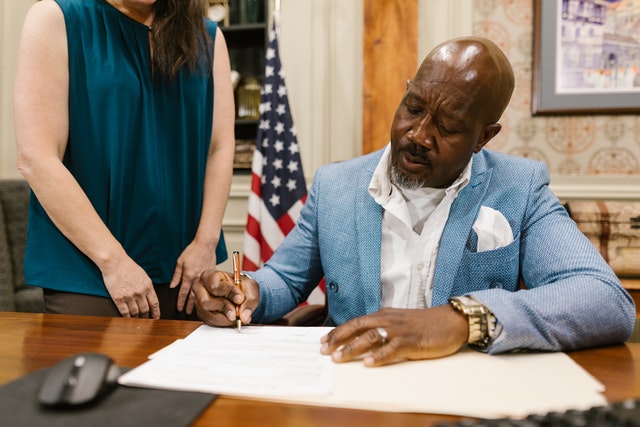What to Include in a Rental Agreement

A lease or a rental agreement is a contract between a landlord and a tenant. It clearly defines the terms and expectations between the landlord and tenant within the duration of the renting period. A lease or rental agreement is a legal contract, meaning that either party can seek legal redress in case of a violation.
For a lease to be effective, there are certain terms that it must contain. The following terms should get you started.
1. Names of All Adult Tenants Living on the Property
Having the names of all the adult tenants living on the property ensures that all of them are liable to the terms of the agreement. So, supposing that the main tenant on the lease is, say, unable to pay rent, you’ll still have a legal foothold to demand it from another.
Also, you may be able to terminate the lease should any one of them violate the terms of the agreement.
2. Who Can Occupy the Property
Clearly specify in the agreement the name of the person who should live there as a tenant. This is the person whose name appears on the lease agreement plus their children.
What this will do is give you the right to determine who should live there. That is, ideally, people who have passed your tenant screening process.
.jpg)
So, in the event your tenant moves in a friend or a relative or illegally sublets the unit, you’ll be able to evict them for violating the lease.
3. The Length of Time the Lease Will Be Active
An essential component of any lease or a rental agreement is the start and end dates of the tenancy. Therefore, clearly specify the duration of time the signed lease accounts for.
Short-term leases automatically renew every month unless either party decides to terminate it by giving the other party a month’s notice. A lease, on the other hand, runs anywhere between six months to a year. It only terminates once the entire term has run its course or when broken.
The risk of not doing this is having a holdover tenant. A holdover tenant is a tenant who refuses to leave after their lease has ended. If the lease doesn’t have an end date, the tenant might even be unaware they’re supposed to move out.
4. Important Details About Rent
Of course, no tenant will sign a lease or a rental agreement without first knowing how much rent they must pay. However, there are other crucial details about the rent that the tenant should know before signing.
One such detail is about late fees. Will you charge your tenant a late fee? If so, add it into the lease along how much it’ll be and when it’ll come into effect. But please note that, in the state of Maryland, late fees cannot exceed 5% of the rent due.

Another detail is on how tenants should pay rent. Acceptable methods of rent payment include cash, by mail, and online via a portal. If you only accept a specific type of payment, there should be a clause that states as much in the lease.
5. Important Details Regarding a Tenant’s Security Deposit
The use and return of security deposits is often a source of conflict between landlords and tenants. An example of such a conflict could be:
- The tenant vacates the unit, making what they think is a reasonable effort to return the unit as they found it.
- The landlord, however, thinks otherwise and makes appropriate deductions to the deposit, as they consider the tenant to have made damages exceeding normal wear and tear.
- The tenant becomes infuriated with the deductions and heads to court claiming the landlord has illegally withheld their deposit.
Thus, to avoid such a scenario with your tenant, make sure to abide by the state’s security deposit laws. Specifically, understand the state’s limit, store it the right way, provide a written notice after receiving it, and return it within the stipulated time.
Another good idea is to do a move-in and move-out inspection or regular inspections with pictures and the signed consent of the tenant. This way, you have proof of damage for any deductions you may make to the security deposit.
6. Your Right to Enter Their Rented Premises
Besides security deposits, landlord entry is often another common source of conflict between landlords and tenants.
As a landlord, you may think that you can barge in on your tenant whenever you like. Your tenant, on the other hand, may think that they are giving you a favor by allowing you entry.

Both parties to the lease have certain rights. As a landlord, one such right is the right to enter rented premises. You may need to enter your tenant’s rented unit to carry out important responsibilities, such as:
- To inspect the unit for adherence to the lease agreement
- To make requested or needed repairs to ensure the home complies with the state and local habitability codes
- Respond to an emergency
- Show the unit to prospective buyers, lenders or tenants
That being said, your tenant has a right to privacy. Your right to entry shouldn’t interfere with their right to enjoy the property in peace and quiet. Due to this, most states require landlords to notify their tenants first prior to an entry.
Maryland is yet to pass legislation regarding landlord entry. But to avoid any unnecessary conflict, notifying your tenant beforehand is important. Keeping your renters happy should be a priority.
7. Responsibility for Repair and Maintenance Issues
Maintenance issues are bound to occur at some point during a tenancy. The following are common issues to expect:
- Pest control problems
- No hot water
- HVAC problems
- Garbage disposal not working
- Dripping faucets
- Clogged drains
- Broken locks
- Appliances not working
So, let your tenant know what they are responsible for when it comes to repairs and maintenance. For instance, let them know that they have a responsibility to always keep their unit clean and sanitary.
Also, let them know that they are responsible for letting you know when maintenance issues crop up.
Bottom Line
Do you want help drafting a solid lease agreement? If so, McKenna & Vane Property Management can help. We are an expert property management company in Maryland, specializing in Howard, Carroll, Frederick and Montgomery Counties.
